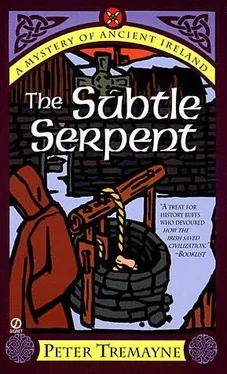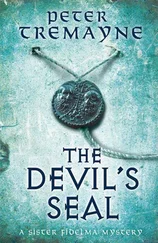Peter Tremayne - The Subtle Serpent
Здесь есть возможность читать онлайн «Peter Tremayne - The Subtle Serpent» весь текст электронной книги совершенно бесплатно (целиком полную версию без сокращений). В некоторых случаях можно слушать аудио, скачать через торрент в формате fb2 и присутствует краткое содержание. Жанр: Исторический детектив, на английском языке. Описание произведения, (предисловие) а так же отзывы посетителей доступны на портале библиотеки ЛибКат.
- Название:The Subtle Serpent
- Автор:
- Жанр:
- Год:неизвестен
- ISBN:нет данных
- Рейтинг книги:3 / 5. Голосов: 1
-
Избранное:Добавить в избранное
- Отзывы:
-
Ваша оценка:
- 60
- 1
- 2
- 3
- 4
- 5
The Subtle Serpent: краткое содержание, описание и аннотация
Предлагаем к чтению аннотацию, описание, краткое содержание или предисловие (зависит от того, что написал сам автор книги «The Subtle Serpent»). Если вы не нашли необходимую информацию о книге — напишите в комментариях, мы постараемся отыскать её.
The Subtle Serpent — читать онлайн бесплатно полную книгу (весь текст) целиком
Ниже представлен текст книги, разбитый по страницам. Система сохранения места последней прочитанной страницы, позволяет с удобством читать онлайн бесплатно книгу «The Subtle Serpent», без необходимости каждый раз заново искать на чём Вы остановились. Поставьте закладку, и сможете в любой момент перейти на страницу, на которой закончили чтение.
Интервал:
Закладка:
Peter Tremayne
The Subtle Serpent
“Now the serpent was more subtle than any beast of the field which the Lord God had made.”
— Genesis 3:1Chapter One
The gong was struck twelve times, its vibration rousing Sister Brónach from her contemplation. Then she heard the gong being struck once again; a single, clear, sharp note. She sighed as she recognised the lateness of the hour and, rising swiftly from her knees before a statue of the Christ in His Suffering, she genuflected. It was an automatic motion, hastily made without thought or meaning, before she turned and made her way from the duirthech, the wooden chapel of the abbey.
In the stone-flagged corridor outside the doors of the chapel, she paused as her ears detected the curious shuffling of leather-soled sandals on the stone. Round the far corner, along the gloomy passageway, which was lit by smoky candles of fat, fixed in their iron holders to the walls, came a procession of dark robed and cowled figures, walking two by two. The hooded figures of the sisters, led by the imposing, tall figure of the matriarch of their order, seemed like a line of wraiths haunting the dim corridor. The sisters of the community of The Salmon of the Three Wells, a euphemism for the Christ, shuffled along with heads bowed; no one looked up as they passed Sister Brónach, who was now standing to the side of the open door to the chapel. Not even the Abbess Draigen acknowledged her presence. The sisters proceeded, without speaking, into the chapel for the midday prayers. The last of the sisters paused only to turn and close the door behind the procession.
Sister Brónach had waited, with hands folded before herand head respectfully bent, as they passed her by. Only when the chapel door thudded softly closed behind them did she raise her head. It was plain to see why Sister Brónach bore her name. Her countenance was, indeed, sorrowful. The middle-aged religieuse was never known to smile. In fact, she was never known to demonstrate any emotion, her features seemed permanently engraved in lines of doleful meditation. There was an irreverent saying among her fellow religieuses that if Brónach the Sorrowful ever smiled it would herald a ‘second coming’ of the Saviour.
For five years Brónach had been the doirseór, the doorkeeper, of the community which had been founded by the Blessed Necht the Pure over three generations before. The foundation was perched on a lonely southern peninsula of the kingdom of Muman, the south-westerly of the five kingdoms of Éireann. It stood at the foot of the mountains, in a small, wooded inlet of the sea. Brónach had joined the community when she was a young, timid and unenterprising woman, thirty years ago. She had sought refuge in the community purely as a means of sanctuary from the harsh and demanding life of her isolated island village. Now, in her middle years, Sister Brónach remained as timid and unenterprising as ever she had been; content to let her life be governed by the sounding of the gong from the small tower where the time-keeper kept watch on the community’s water-clock. The community was famed throughout the kingdom for its remarkable time-keeping. On the sounding of the gong, Sister Brónach would have some task to fulfil in her office as doorkeeper of the community. The office, doirseór, sounded consequential but it was no more than a title for a maid of all work. Yet Sister Brónach seemed contented with her lot in life.
The gong had just sounded the hour of midday when it was Sister Brónach’s task and duty to draw water from the well and take it to the Abbess Draigen’s chambers. After the midday prayers and meal, the abbess liked to bathe in heatedwater. Therefore, instead of attending the services with the rest of her sisters, Brónach would retreat to draw the water.
Hands folded under her robes, Sister Brónach moved quickly forward, her leather sandals slapping the granite stones which paved the passage from the old wooden chapel, the duirthech, or oak house as such churches were always called, and into the main courtyard around which the habitations of the community were built. There had been a flurry of snow earlier that morning but it had already melted into a wet slush causing the paving of the square to be slippery. But she progressed confidently across it, passing the central bronze sundial, mounted on its polished slate plinth.
Although it was a cold, wintry day, the sky was mainly a translucent blue with a pale sun hanging high amidst wisps of straggling clouds. But here and there, along the horizon, low leaden clouds filled with snow hung in patches and Brónach could feel the chill air around the tips of her ears. She pulled her headdress tighter around her head for comfort.
At the end of the abbey courtyard stood a granite high cross, which sanctified the foundation. Brónach passed through a small opening beyond the cross and onto a tiny rocky plateau overlooking the sheltered inlet on which the religious foundation stood. On this natural rocky dais, which stood only ten feet above the stony shoreline of the inlet, from an aperture in the rugged ground, the Blessed Necht had found a gushing spring. She had sanctified the well. It had needed a benediction, for the stories told how it had previously been a spot sacred to the Druids who also drew water from this well.
Sister Brónach walked slowly to the well-head which was now encircled by a small stone wall. Over this the members of the community had constructed a mechanism for lowering a pail into the dark waters, now far below ground level, and then raising it by means of turning a handle which cranked a rope, winding it up and down. Sister Brónach couldremember a time when it took two or three of the sisters to raise water from the well whereas, after the mechanism was constructed, even an elderly sister could work it without great hardship.
Sister Brónach paused for a moment in silence as she stood at the well-head and gazed at the surrounding scenery. It was a curiously quiet hour of the day: a period of inexplicable silence when no birds sing, no creatures move and there is a feeling of a suspension of life, a feeling of some expectation; of waiting for something to happen. It was as if nature had suddenly decided to catch its breath. The chill winds had died away and were not even chattering among the tall granite peaks which rose behind the abbey. Sheep still wandered over their rough stone terrain like moving white boulders, while a few sinewy black cattle were gnawing at the short turf. Sister Brónach perceived the hollows of the hills were filled with the mystic blue shadows caused by the hanging clouds.
Not for the first time did Sister Brónach feel a sense of awe at her surroundings and at this mysterious hour of expectant tranquillity. She felt that the world seemed poised as if waiting for the blast of ancient horns which would summon the old gods of Ireland to appear and come striding down from the surrounding snow-peaked mountains. And the long grey granite boulders, which were scattered on the mountain sides, like men lying prone in the crystal light, would suddenly turn into the ancient warrior heroes of past ages; rise up and march behind the gods with their spears and swords and shields, to demand why the old faith and old ways had been forsaken by the children of Eire, the goddess of sovranty and fertility, whose name had been given to this primeval land.
Sister Brónach suddenly swallowed sharply and cast a swift, guilty glance around her, as if her fellow companions in Christ would hear her sacrilegious thoughts. She genuflected swiftly, as if to absolve her sin in thinking about the old,pagan gods. Yet she could not deny the truth of the feeling. Her own mother, peace be on her soul, had refused to hear the word of the Christ and remained firm in her belief in the old ways. Suanach! It was a long time since she had thought about her mother. She wished that she had not, for the thought cut like a sharp anguished blade in her memory even though it was twenty years since Suanach’s death. Why had the memory come? Ah yes; she was thinking of the old gods. And this was a moment when, it seemed, the old gods and goddesses were making their presence felt. This was the hour of pagan sadness, a sorrowful echo from the very roots of the people’s consciousness; a yearning for times past, a lament for the lost generations of Eire’s people.
Читать дальшеИнтервал:
Закладка:
Похожие книги на «The Subtle Serpent»
Представляем Вашему вниманию похожие книги на «The Subtle Serpent» списком для выбора. Мы отобрали схожую по названию и смыслу литературу в надежде предоставить читателям больше вариантов отыскать новые, интересные, ещё непрочитанные произведения.
Обсуждение, отзывы о книге «The Subtle Serpent» и просто собственные мнения читателей. Оставьте ваши комментарии, напишите, что Вы думаете о произведении, его смысле или главных героях. Укажите что конкретно понравилось, а что нет, и почему Вы так считаете.











